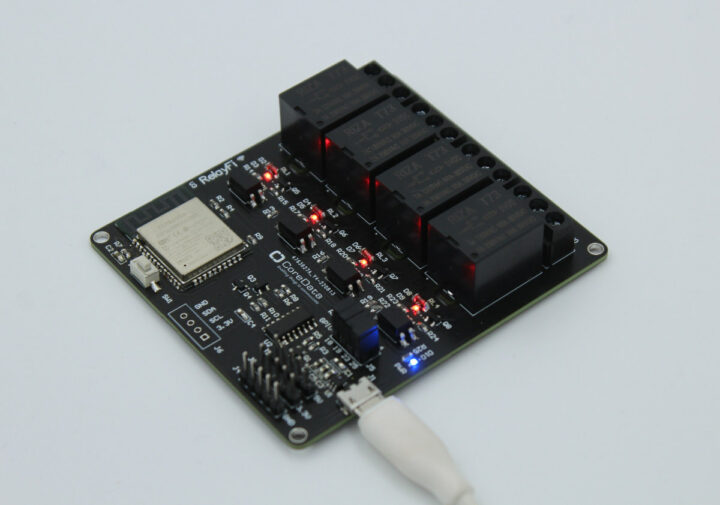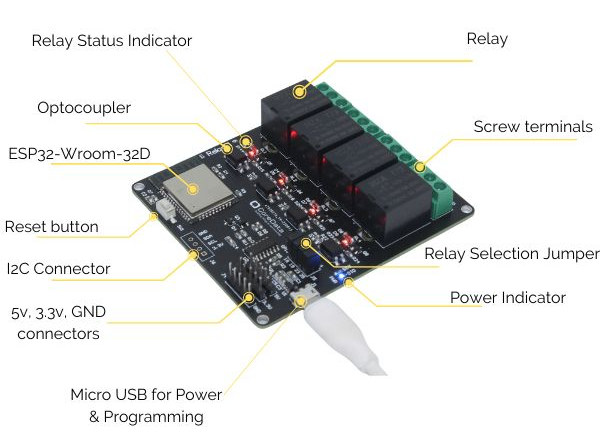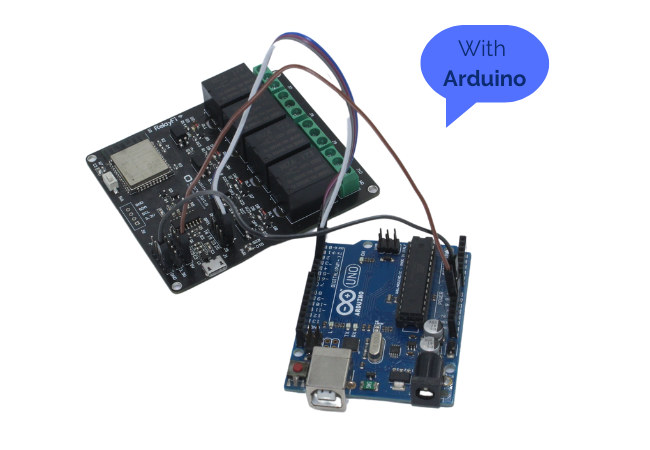CoreData Global, a Singapore-based research and development firm, has just introduced the RelayFi 4-channel relay board based on ESP32 and compatible with Tasmota open-source firmware, as well as Espressif’s ESP RainMaker cloud and ESP-NOW networking API.
RelayFi is fitted with an ESP32-WROOM-32D WiFi and Bluetooth module, four relays capable of handling a load of 250 VAC/7A or 30 VDC/10A, and EL817C Optoisolators for safety. The board also comes with CH340C USB to TTL chip for programming, an I2C header for expansion, and some jumpers for relay selection.
RelayFi specifications:
- Wireless module – Espressif Systems’ ESP32-WROOM-32D module with ESP32 dual-core Tensilica microcontroller, 32Mbit SPI flash, Wi-Fi 802.11 b/g/n up to 150 Mbps, Bluetooth 4.2 LE, and PCB antenna
- Relays
- 4x relays up to 250VAC/7A or 30VDC/10A
- 4x EL817C optocouplers for safety
- 4x relay status LEDs
- Screw terminals
- Relay selection jumper
- USB – 1x micro USB port for power and programming via CH340C USB to TTL chip
- Expansion – I2C header
- Misc – Power LED reset button
- Power Supply
- 5V via micro USB port
- Header with 5V, 3.3V, and GND
- Dimensions – 84.3 x 75.1mm
The company shares the PDF schematic and a simple Arduino sketch to control the relays on Github. Documentation is currently lacking, but CoreData Global highlights compatibility with smart speakers supporting Amazon Alexa or Google Assistant through the open-source Tasmota firmware and promises to release the “codes and methods” during the Kickstarter campaign.
In the meantime, you can check out a video demo showing Alexa voice control of lights and fans.
They also claim compatibility with Arduino, Raspberry Pi, BeagleBone, and other development boards. For example, you could power an Arduino board through the 5V/3.3V/GND header on the RelayFi, and the Arduino can enable/disable relays as needed instead of using jumpers as shown in the photo below.
While CoreData Global is said to be a Singapore company, the RelayFi board was launched on Kickstarter by Rajneesh Kumar Singh based in Switzerland… The RelayFi 4-channel relay board is offered for a $30 US pledge, or you can get a bundle of five for $137, or around $27.4 each. Shipping adds about $25 US, and deliveries are expected to start in December 2022.

Jean-Luc started CNX Software in 2010 as a part-time endeavor, before quitting his job as a software engineering manager, and starting to write daily news, and reviews full time later in 2011.
Support CNX Software! Donate via cryptocurrencies, become a Patron on Patreon, or purchase goods on Amazon or Aliexpress









I’m not seeing a lot of advantages to the 4-channel TTGo T-Relay covered back in June.
Having a built-in USB to TTL is nice, but it doesn’t justify a +200% price increase
Plus this isn’t a groundbreaking product, plenty of them out there already for the fraction of the price.
If the components are high quality, that could make a difference. Also, for anything AC, a big question is: has it been certified (UL or other NRTL)?
Can anyone please explain what “safety” the opto-couplers add? Am I missing something here?
Hi Sander, Indeed the optocouplers are useless and a total waste of money in the setup, they do not add any safety or isolation. It’s incredible Jean-Luc Aufranc from CNX did not notice this and removed this from his site or comment himself. Clearly work from an Amateur at work that has totally now idear what he is doing. It;s even dangerous since the way the optocouplers are driving the relays could even fail if not properly designed and operated in saturated range.
The I/O pins could be used to drive a simple BSS138BK mosfet with a gate resistance of 33K to ground to control the relays directly saving some 4 components per relay including the opto’s that serve no purpose in this setup.
Please explain the danger in greater detail.